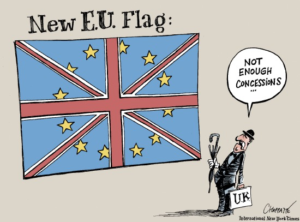The results of today’s referendum in the United Kingdom present an unprecedented situation for a strained European Union. For the first time in its history, a member state voted to leave the Union. In an organization that grew exponentially, the exit of a powerful contributor will force remaining nations to make some tough choices. The UK will also need to make some hard decisions about how to move forward outside of “Europe”. Needless to say, the Brexit will not be an easy process for anyone.
The UK has historically played balancing role on the continent, but this referendum represents a decisive departure from Britain’s neighbors and a vote of no-confidence in the European Union. Eurosceptic voters of the UK have many reasons to want to sever ties with Brussels: the aftermath of the economic dysfunction made manifest by the near-miss of the Grexit, the inconsistent and frantic response to the refugee crisis, and the resurgence of a bold and unpredictable Russia. British voters, however narrowly, ultimately lost faith with the European Project.
In choosing to leave the union, the UK has lost its privileged position as one of the leaders of a modern, unified Europe. Great Britain had a unique position in the Union as one of the only states with a balance of political, economic, and military might – a position it built over the decades through active diplomatic and economic engagement in continental affairs. It was arguably the most independent of EU members, enjoying many of the benefits of Union membership without the risks of the Euro, or the borderless society of the Schengen Agreement. Britain’s options for influencing the continent are now weakened, and the benefits of Union membership lost –a unilateral disarmament of what was once a formidable diplomatic and economic arsenal.
Centrifugal Force
Europe had a lot to lose from a British exit. Strong and independent Britain played a stabilizing role: ensuring no single country –namely France or Germany– could push a unilateral direction upon the EU. It was a role only the UK could play. Italy and Spain are prone to economic and political instability; the Low Countries and Scandinavia, though economically formidable, do not have the clout or muscle needed to balance their larger neighbors; and the Višegrad economies of Eastern Europe are too new, many with elected governments more interested in moving away from Europe than towards it. Germany is the de facto leader of the EU, which is a source of great discord among the smaller, more economically-vulnerable nations that do not appreciate Chancellor Merkel’s heavy-handed style or the historical aftertaste of German leadership.
Though division within the EU is not new, the departure of its great offshore stabilizer starts the political centrifuge spinning. Right-wing leaders in France, and the Netherlands are already demanding independence referendums of their own. Spain’s call for dual-sovereignty of Gibraltar is a sign that some disputes between the UK and other EU member states may reemerge after being held dormant by a spirit of intra-Union cooperation. In the immediate aftermath of the vote, prominent leaders in many of the EU’s major nations called for their nations to follow Britain’s lead.
Not surprisingly, independent-minded regions within European nation-states will also ride the winds of change to clamor more loudly for their independence. In a bizarre twist, Scotland may have voted to remain in the EU, but may not want to stay in a non-EU Britain. No doubt Basques and Catalans in Spain will watch closely if a second independence referendum takes place in Scotland, and aspiring EU members in the Balkans are unlikely to tolerate a long and painful application process while the more developed countries are voting to leave.
The Brexit may well be the spark that brings about the dissolution of the European Union. Its erosion and potential breakup would deprive its member states of a useful venue for cooperation to solve common problems; an international political situation closer to 1914 than 2016. At a time when transnational issues are more relevant than national ones, it is not at all clear why European leaders are divesting themselves of international tools to deal with them. Europe should take a moment to reflect on its fractured past.
Opportunity in Discord
As noted European diplomat, Victor Angelo recently predicted: Europe will survive Brexit. What is not clear is whether the EU or the UK will survive their divorce intact. Perhaps the Union grew too quickly, haphazardly attempting to unify the continent in the wake of the collapse of the Soviet Union, pushing “Europe’s” borders ever outward. In this manner, Brussels hardwired weaknesses into the future unity of the European Union.
But, as I’ve said before, there is opportunity in crisis. Challenges can break a weak union or strengthen a strong one. Perhaps this is the kind of shock Europe needs to wake up and implement further democratization and a unified fiscal policy towards a federal union. Any other course could doom the entire project to failure, and erase all the good Europeans have built, together.
 LT Nick Avila is a U.S. Naval Officer serving in Belgrade, Serbia. He received his B.A. in History with a focus on American Diplomacy from Amherst College in 2008. He is an MH-60S helicopter pilot by trade and has military experience from two deployments in the western Pacific to include operations in Guam, Japan, and Australia. The views expressed here are his own and not those of the US Navy.
LT Nick Avila is a U.S. Naval Officer serving in Belgrade, Serbia. He received his B.A. in History with a focus on American Diplomacy from Amherst College in 2008. He is an MH-60S helicopter pilot by trade and has military experience from two deployments in the western Pacific to include operations in Guam, Japan, and Australia. The views expressed here are his own and not those of the US Navy.




